The 2020 Voter Guide
Colorado State Board of Regents election
What is the CU Board of Regents?
By Miriam Ritter, Contributing Writer
Voting can be really confusing. The ballot is not always clear and the language is not very straightforward. That is why it is important to educate yourself about the candidates and issues before you get your ballot. While you may know which way you are voting for the presidency, or for the senate, smaller positions are usually more difficult to navigate. There is not as much information about these candidates being circulated online or in the news. That is why The Bold is here to help. Follow along with the questions below to understand more about the CU Board of Regents and the candidates. Or, for even more details on the candidates, check out this easy-to-navigate Instagram page: @cuvoterguide.
The CU Board of Regents consists of nine members (one member from each of Colorado’s seven districts, and two from the state at large) who serve six year terms. This board essentially controls and allocates all of the university’s funds. This means that whoever is chosen for this board, decides where money is directed and how it is spent.
This year, Coloradans will only be voting on three members for the CU Regent– a member from District 2, 6, and 7. For the purpose of this particular voter guide, we will focus on the Unity Party candidate from District 6 and the Libertarian candidate from District 2.
District 2
Christian Vernaza
Libertarian Party
By Miriam Ritter, Contributing Writer
What is the Libertarian Party and who is the Libertarian candidate in District 2?
- The Libertarian Party is a political party in the United States. The party aligns itself with promoting civil liberties, laissez-faire capitalism, non-interventionism, and limiting the size and scope of government.
- Laissez-faire capitalism: free market capitalism, meaning that the government should not interfere with individuals’ economic practices.
- Non-interventionism: a foreign policy that holds leaders should not interfere with foreign nations affairs, but maintain diplomacy and trade.
- The Libertarian Party candidate running in District 2: Christian Vernaza
- While there is not much information on Vernaza online and it is difficult to contact him, he aligns himself with the Libertarian Party of Colorado and their values.
Callie Rennison
Democratic Party
By Juliana Abbrescia, Contributing Writer
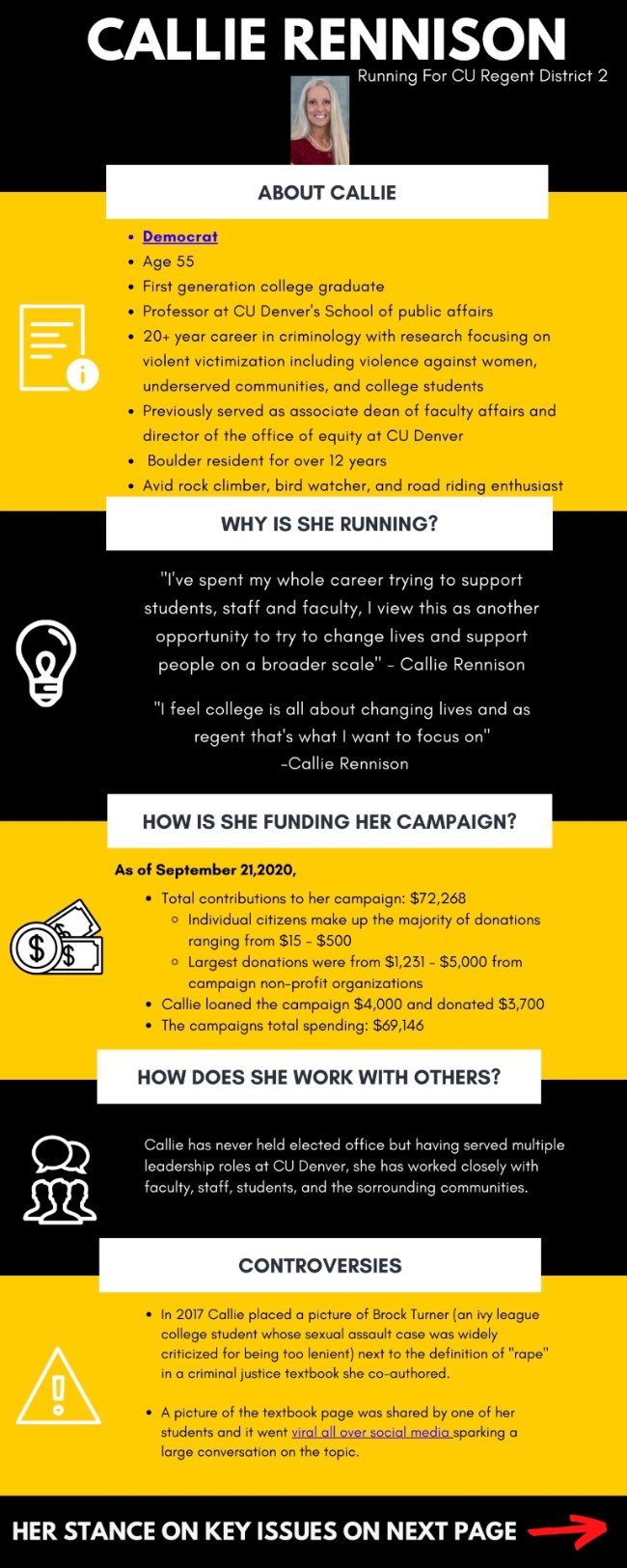
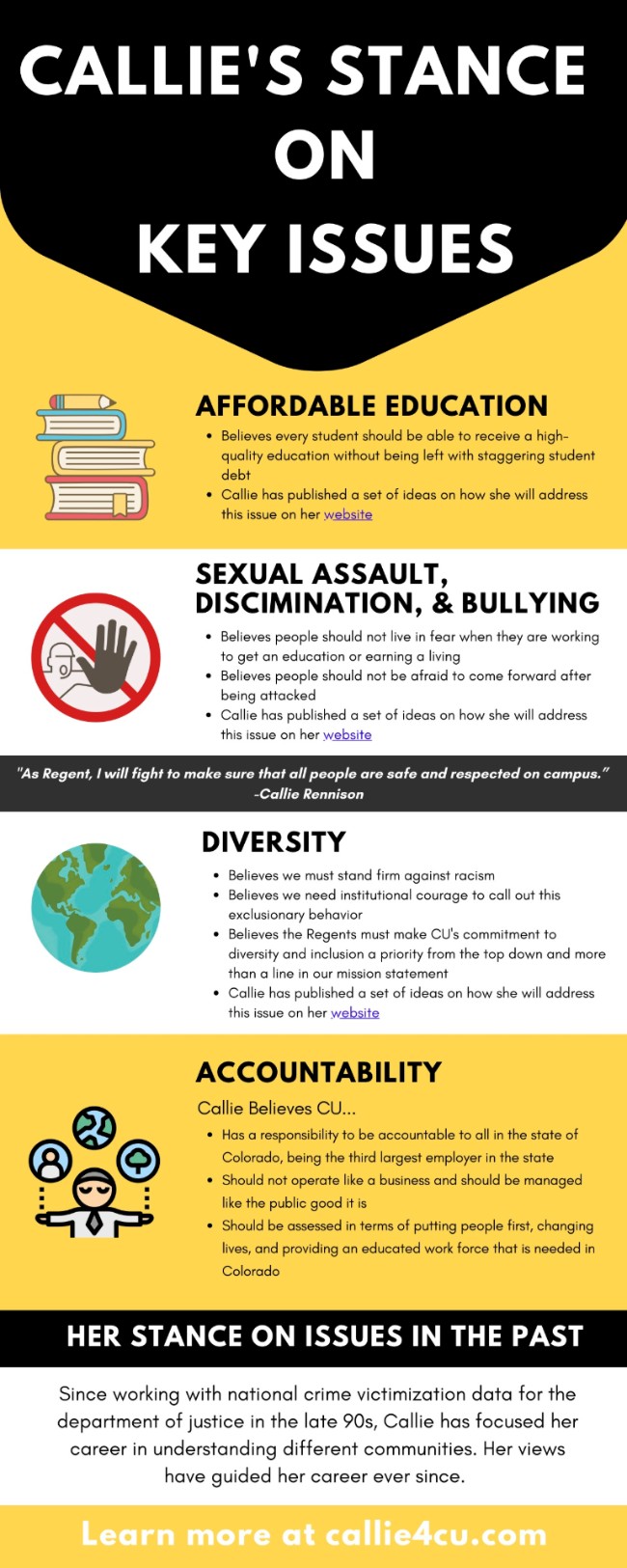
Dick Murphy
Republican Party
By Juliana Abbrescia, Contributing Writer
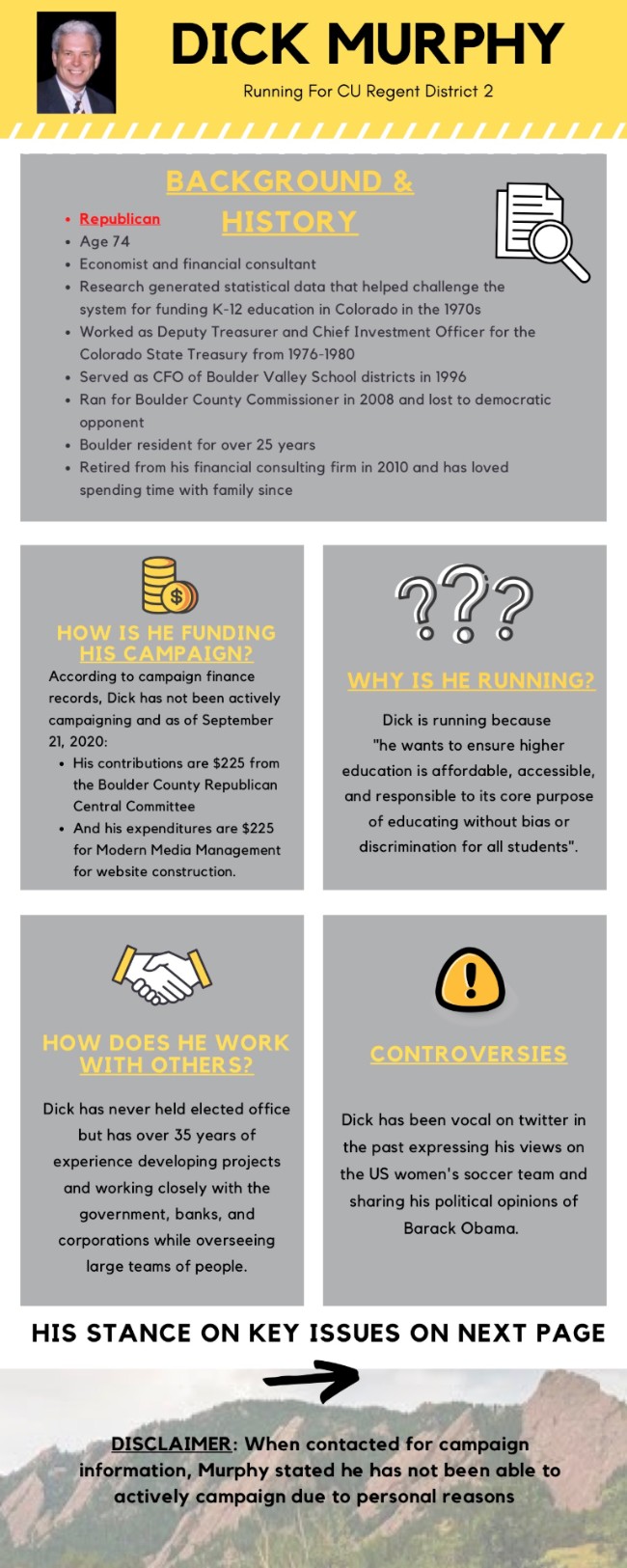
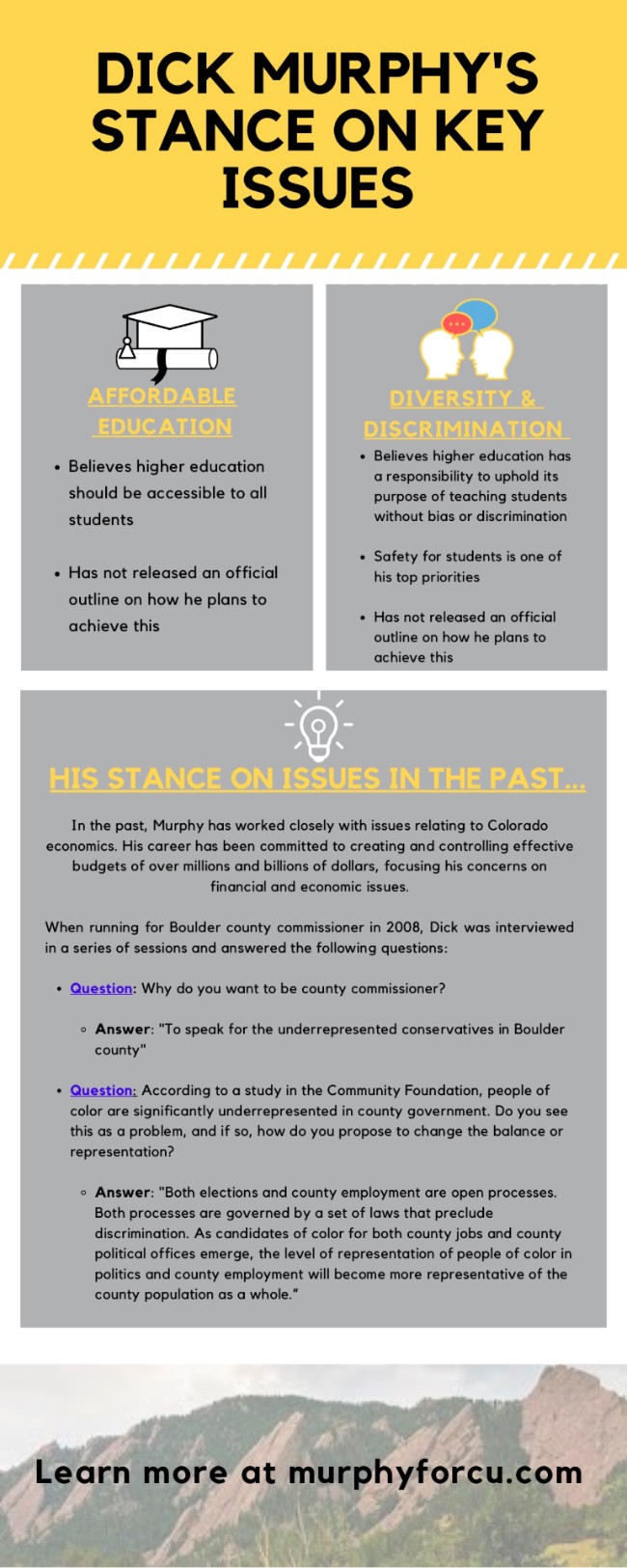
District 6
By Anabella Rohrbaugh, Contributing Writer
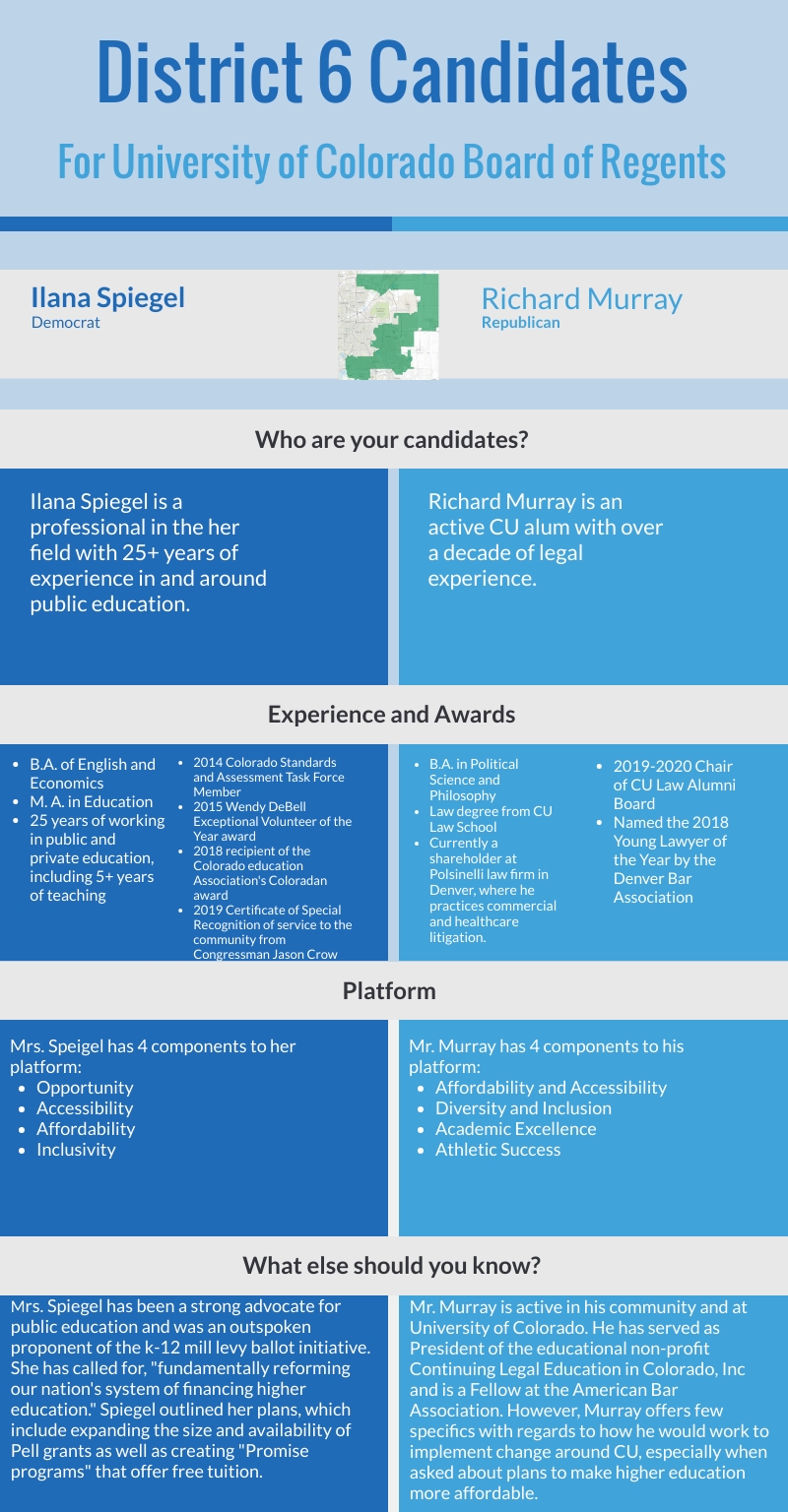
Christopher E. Otwell
Unity Party
By Miriam Ritter, Contributing Writer
What is the Unity Party and who is the Unity Party candidate in District 6?
- The Unity Party is a centrist national party that was founded in 2004. It aligns itself with the slogan: “Not Right, Not Left, But Forward!”
- The Unity Party candidate running in District 6: Christopher E. Otwell
- Why is Otwell running?
- A quote from Christopher E. Otwell that I received directly: “As a University Instructor (Colorado Technical University) myself, I believe strongly in making education available to as large of a group of people as possible. Therefore, I’m wanting to have CU start to provide classes to non-traditional students as well as traditional students on a regular basis [Evening and Weekend classes], eliminate fees on Students that inhibit participation [Parking Fees], provide online teaching for everyone [not just because of the Pandemic, but because it’s the right thing to do – as I pushed for in the 2018 CU Regent Election], and to bring down the overall cost of education through reuse of material [teach once, use for many classes], and migration away from physical books to eBooks [Cheaper & Environmentally Friendly]” –Christopher E. Otwell, 2020.
- This is the second election that Otwell has run for this position. The first time around was the State-Wide “At-Large” CU Regent candidate position, in which he earned the 3rd largest vote total of all Non-Republicans and Non-Democrats in the Colorado 2018 election.
- How have Otwell’s ideas and policies changed since 2018?
- Otwell’s ideas for implementing more technology into classrooms (i.e. e-textbooks for classes) to reduce yearly cost for students, as well as ideas for fixed tuition for six years has not changed much. He still believes these will improve spending for the university and the students. Otwell also wants to implement more online learning for students and teachers, not just because of the pandemic, but because it will make education more accessible.
- Does Otwell have any agreements with his opponents? If so, what are they?
- “I am not aware of that many policies or areas of agreement between myself and my opponents. If they were to acknowledge my existence, and accept my offer for a face-to-face debate that is mediated by the News Media, then we might learn where we agree and disagree more clearly” (Denver Post, 2018).
- ***For more information about Otwell’s specific goals and policies, visit @cuvoterguide Instagram page***
- Why is Otwell running?
District 7
Nolbert Chavez
Democratic Party
By Hannah Prince, Newspaper Editor-in-Chief
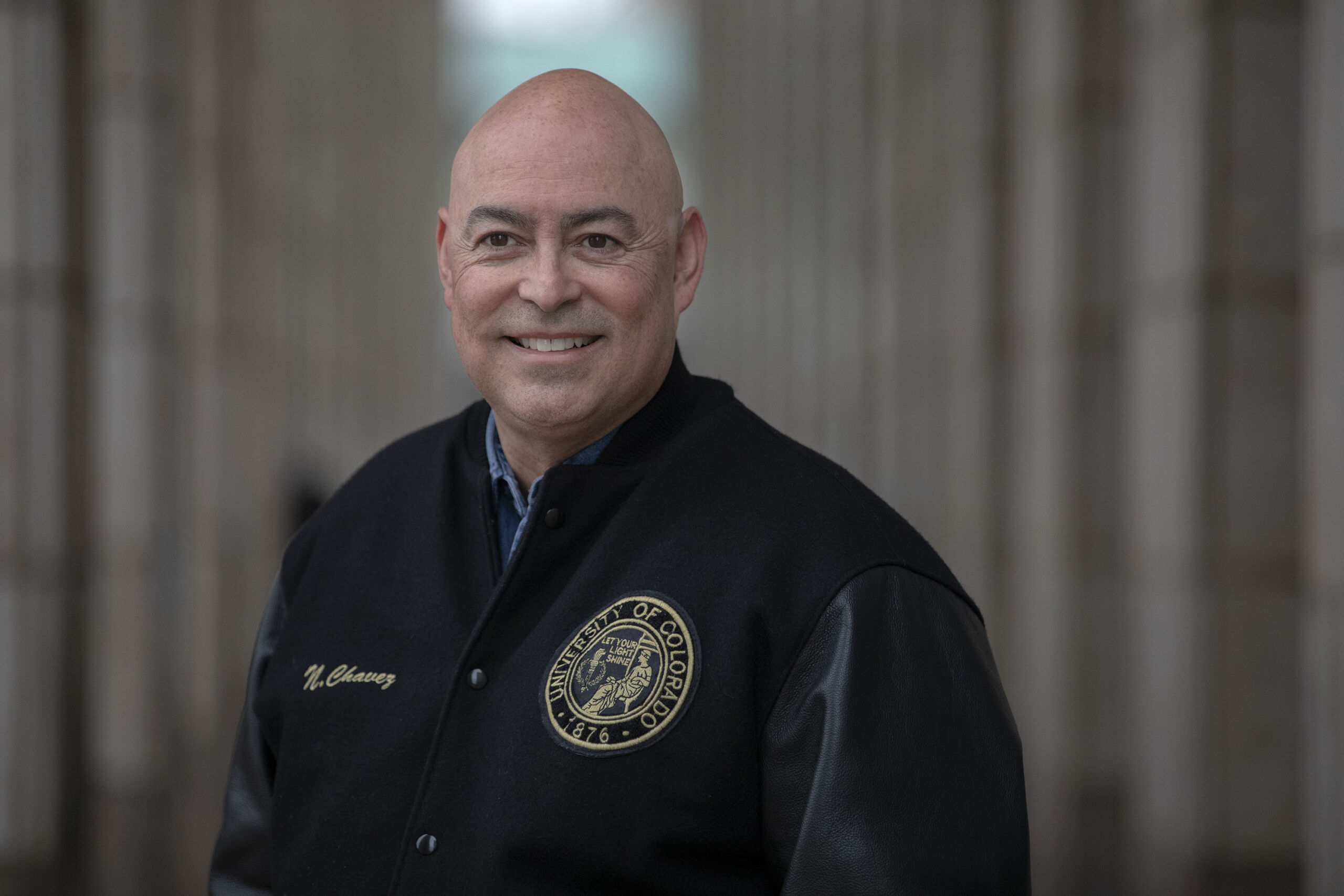
Bio: Nolbert Chavez, 53, has worked at CU Denver since 2016 as chief of external initiatives and executive director of the CityCenter program. Chavez served in the state House of Representatives from 1994-2002. Chavez lives in Belmar with spouse Judy Montero; his daughter attends CU Denver. Listen here for more of Chavez’s biography.
Signature issues: Additional state funding; climate change; civility; curriculum; diversity and inclusion; and equitable financial model
- Additional state funding – Colorado was the fourth lowest state in spending on higher education per student, and fourth lowest per $1,000 of state income, according to a 2017 study by the College Board. Chavez states he will advocate for increased state funding from the legislature and Governor Polis’ administration.
- Climate Change – Chavez strives to prioritize CU’s shift toward renewable energy, as he wants to have honest conversations, “based on science, not fiction.”
- Civility – Chavez served in legislature for eight years. Since 2002, Chavez has noticed polarization between Democrats and Republicans. He plans to “lead by example. We can disagree without being disagreeable.”
- Curriculum – Chavez seeks to support faculty’s role in curriculum. His own experience in higher education includes a bachelor’s degree in management and marketing from University of Phoenix; an executive education program at the Harvard Business School in Corporate Governance; a master’s in political science and public policy from CU Denver; and is currently enrolled in the Doctorate in education and human development program at CU Denver.
- Diversity and Inclusion – In an interview with The Bold, Chavez said, “equity and inclusion are completely in our control. All we have to do – not that this is an easy feat – is decide that this is what we want to prioritize.” Chavez continued there must be systemic change, such as restructuring faculty hiring to student admission processes.
- Equitable financial model – Between the CU campuses, a system of “haves and have nots” have been created, according to Chavez. CU Boulder and the Anschutz Medical Center earn over a billion dollars in research funding with other financial opportunities, while CU Denver and CU Colorado Springs are heavily reliant on tuition funding. He strives to create a more equitable funding model for each campus – CU Boulder, CU Colorado Springs, CU Denver and CU Anschutz.
How seriously is he being considered?
Nolbert Chavez is running unopposed in the CU Regent election for District 7.
On running for CU Regent, District 7:
“I served in the legislature during a time when Democrats and Republicans could argue over policy but still be civil to one another. Gone are those days in both the legislature and the Board of Regents. As your CU Regent, I will lead by example. We can disagree without being disagreeable,” said Chavez in a statement on his campaign website.
Why did you decide to run in 2020?
In an interview with the The Bold, Chavez said, “The first reason is I feel connected with CU in about every way possible. Not only do I work at CU Denver, I am a doctoral student in the school of education and human development. My daughter is a student, so I am a parent of a student at CU Denver. I am a donor. I have taught political advocacy in the school of public affairs here, and I mentor students as well. I am an alum as well.” And Chavez said the second reason he is running is because, “there is opportunity for a new day on the Board of Regents. And I am hoping we are able to see a shift in the majority of who is on the Board of Regents to a Democratic majority.”
How do you think emphasizing “civility” will help you on the Board of Regents?
Of all your major campaign issues – additional state funding; climate change; civility; curriculum; diversity and inclusion; and equitable financial model – which do you think you can make the most imminent effect?
Your victory is assured because you are running unopposed. Why do you think you are running unopposed in 2020?
You state, “we can disagree without being disagreeable,” on your campaign website. In a time of political polarization, what would you say to first-time or young voters to encourage them to vote?
Why do you think young people should be involved in politics?

